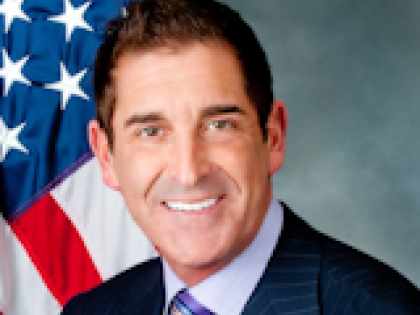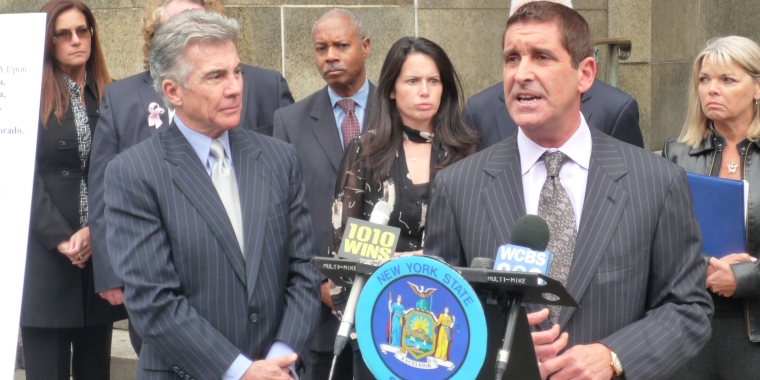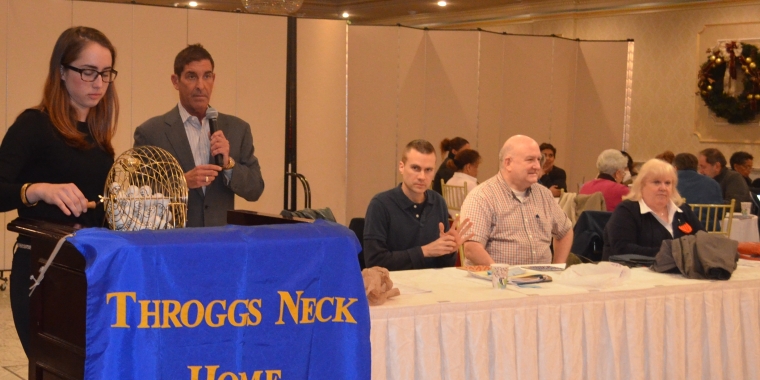
Dna Upon Arrest: Catching More Criminals Across NYS
Jeffrey D. Klein
October 16, 2009
-
ISSUE:
- Crime

FOR IMMEDIATE RELEASE: Contact: Abby Ross
OCTOBER 13, 2009 Office: (718) 822-2049
Cell: (479) 283-3505
DNA UPON ARREST: CATCHING MORE CRIMINALS ACROSS NYS
Senator Klein and FOX’s “America’s Most Wanted” Host John Walsh propose legislation mandating DNA collection upon arrest in order to help solve nearly 30,000 unsolved crimes scenes in New York State
NEW YORK- Deputy Majority Leader and State Senator Jeffrey D. Klein (D-Bronx/Westchester) joined by FOX’s “America’s Most Wanted” Host John Walsh, Bronx District Attorney Robert Johnson, Representatives from the Crime Victims Treatment Center with St. Luke’s Roosevelt Hospital, Safe Horizon and the Surviving Parents Coalition proposed new legislation mandating DNA collection upon arrest outside the Manhattan Criminal Courthouse today.
Klein’s “DNA upon Arrest” bill (S6213) would require New York State and City law enforcement agencies to collect DNA upon arrest for 30 felony crimes including assault, murder, manslaughter, rape, sexual abuse, arson, burglary, robbery and incest.
“Too many crimes remain unsolved in New York State for us to stand by and do nothing,” said Senator Klein. “We have the tools and the know-how to get this done. It is time to make DNA upon arrest law in New York State so that we can apprehend criminals sooner, before they commit further crimes. This legislation will protect and save lives.”
Currently NYS only requires DNA collection after a judge convicts a suspect of any felony crime or 18 specified misdemeanors. Once the DNA sample is collected, the information goes into a statewide DNA databank that also connects to a national databank. The statewide databank contains two types of samples - forensic DNA samples taken from a crime scene and samples taken from criminals after a conviction.
As of August 2009, there were nearly 28,858 forensic samples in the NYS DNA Database taken from crime scenes throughout the state, amounting to nearly tens of thousands of unsolved crime scenes in New York State – which constitutes more than 10% of all unsolved crimes in the United States. However, while New York represents more than 10% of all of the unsolved crime scenes in the United States its database contains only about 4.5% of all DNA profiles in the United States.
The NYS databank launched in 1996. In 2006, NYS passed a law requiring DNA collection for all felony convicts, expanding the databank tremendously. From 1996 to the end of 2007, the program put a name and face to more than four thousand (4,142) crime scene DNA samples. Nearly one-third of those hits came in 2007, the first year after the DNA felony collection law was passed.
Klein’s legislation would increase the pool of offenders in the NYS DNA Databank. As witnessed when the pool was expanded in 2006, the more suspects added to the databank, the more matches that are likely to occur and thus the more crimes that can be solved. Under Klein’s bill DNA would be taken at the same time the arrestee is fingerprinted.
"DNA is the fingerprint of the 21st century. It not only convicts the guilty, but frees the innocent. We owe it to the thousands of crime victims in this country whose cases can be solved by taking a DNA sample,” said John Walsh, Host of America’s Most Wanted and Co-Founder of the National Center for Missing & Exploited Children. I applaud New York state for joining the nearly two dozen other states in the country who have passed 'DNA Upon Arrest' legislation. On behalf of the thousands of New Yorkers and other Americans who will get justice because of this legislation, I thank Senator Klein for his commitment to this issue."
Karen Foster, a member of the Surviving Parents Coalition lost her daughter Bonnie Craig in September 1994 after a man brutally raped and murdered her in Alaska. Thirteen years later, in January 2007, Alaska State Troopers contacted Foster to say that a DNA match finally provided a clue to her daughter’s killer. The suspect entered the prison system in New Hampshire in February 2003 for a series of armed robbery offenses and his DNA could have been taken in July 2003 but it wasn’t entered into the National DNA Database until November 2006. The pre-trial motions for the rape and murder of Bonnie Craig finally began in November 2007 and after 21 pretrial hearings the trial date is now set for April 2010.
“Collecting DNA on all felony arrests will help to make our system more efficient and more just. It will help balance the scales of justice and it will save investigation time, prosecution time, court time; but more importantly, it will save a lot of pain. It will save lives,” said Foster.
“It is known that most criminals, especially sex offenders, travel short distances to the neighboring states to commit the same type of crimes and leave without being connected to those crimes,” said Ahmad Rivazfar of the Surviving Parents Coalition. “The man who abducted, raped, and maimed my 6 and 8 year-old daughters was arrested for molesting a young girl in Texas after using the same method of befriending her single mother that he used with my former wife. DNA on arrest will provide protection for the innocents along the path of these criminals on vacations away from their home states and it would make them think twice before they choose NY as a vacationing spot.”
“Taking DNA upon felony arrest is a powerful tool to solve crimes, prevent crimes and save lives. Case studies have shown how countless rapes and murders would have been prevented if DNA were taken upon arrest. When this DNA legislation passes, it will provide the answers that families desperately need,” said Mary and Doug Lyall of the Surviving Parents Coalition.
Klein’s proposed bill would also help catch repeat offenders quicker. According to NYS DCJS, on average, offenders linked to crimes on the DNA databank had approximately 11 prior arrests and five prior convictions. Eighty three percent of offenders linked to sexual assault cases were in the state’s DNA databank for a crime other than a sex-related offense.
Under Klein’s bill, should an individual not be convicted, they could request the purging of their DNA sample from the database.
Twenty-one states have already passed DNA upon arrest legislation including Texas, Virginia, Minnesota, California, New Mexico, Alaska, Arizona, Kansas, Tennessee, South Dakota, North Dakota, Maryland, Michigan and South Carolina. DNA upon arrest bills are currently pending in several other states including Colorado, Ohio, Pennsylvania and North Carolina. Federal law also allows for DNA collection upon arrest.
“The District Attorneys Association strongly supports legislation that requires the collection of DNA at the time of arrest. We commend Senator Klein for recognizing what we have long known that expanded DNA collection enhances our ability to solve crimes and protect the people of our state. We believe that this issue is so important that the legislature should consider it as stand alone legislation,” said Kate Hogan, President of the District Attorneys Association.
"I commend Senator Klein for taking a huge step today in seeking to enhance the safety of all New Yorkers. His bill, mandating the taking of DNA samples at arrest for certain designated offenses, will not only aid immeasurably in convicting the guilty, it will also exonerate the innocent. Had this law been in place in New York, my constituent Carol Nelson would
be alive today and I would not have to explain to her grieving family why
Glen Shoop was free to murder her,” said William Fitzpatrick, Onondaga County District Attorney.
Klein’s bill has been introduced to the New York Senate.
* * *
Share this Article or Press Release
Newsroom
Go to NewsroomState Senator Jeff Klein Turns Up the Heat on Coldest Bronx Buildings
November 30, 2014
State Senator Jeff Klein turns up the heat on coldest Bronx buildings
November 30, 2014
State Senator Jeff Klein turns up the heat on coldest Bronx buildings
November 30, 2014
